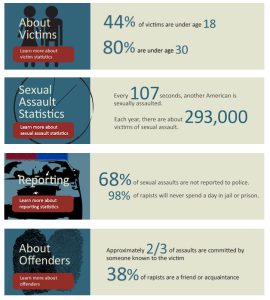Francis Lee ’16, Claudia Teti ’16: T.J. Locke, Head of School, sent a letter home to all Episcopal parents on April 10th informing them that a teacher that previously taught at EA, Richard Smith, was being arrested for sexual crimes against children. In his letter Locke wrote, “During our review, we received reports of abuse by Smith which occurred in the late 70s and early 80s. We were devastated to learn through our review about the extent of Smith’s conduct, which we now understand involved at least eleven former Episcopal students.” While these events occurred decades ago, the release of this information has prompted Scholium to take a deeper look into the issue of sexual assault.
“For the most part, I like to think that most adults are good people and make good choices around kids, but to think that sexual assault doesn’t exist would be hiding our heads in the sand,” said Nicole Chaikin, Upper School psychiatrist. Chaikin expressed the need for students to be aware of this danger, whether they feel threatened by a stranger or someone they know. “I think that there’s a lot of expertise with parents warning their kids about ‘stranger danger’ and all that kind of stuff, but I don’t think that there’s really great and strong conversations about the higher risk factor being someone you know: someone that’s in your life, someone who is trustworthy, whether it’s a family member, or just a teacher or coach or something along those lines. Those kinds of closer relationships are ones that are going to put kids more at risk.”
According to the United States Department of Justice’s National Sex Offender Public Website, 35.8% of sexual assaults occur when the victim is between the ages of twelve and seventeen. Chaikin explained the reason for this, saying, “Often times middle schoolers are a higher risk group because they are starting to separate from their parents and they aren’t necessarily looking to their parents as the only authority and they are starting to develop more relationships out of the home, more with teachers and other trusted adults, and I think that’s where a lot of vulnerability comes in.”

Photo Courtesty of https://www.rainn.org/statistics
The main advice that Chaikin gives to students is to feel comfortable telling someone if they ever feel like their emotional health, wellbeing or safety is being threatened. While she encourages open dialogue between students and their parents, Chaikin remarked that she understands that this does not alway come easy and EA faculty are great alternative options. “You should always check it out with somebody; there’s a lot of adults here. If you’re really close with your form dean or your advisor or your science teacher, then that’s a wonderful person to go to.” Carolyn Bell ‘16 commented, “I think the school makes me feel as though I could tell someone if I was ever in this situation.”
However, this process can often prove to be difficult for victims to carry out. “It’s so easy for a student to feel like they’ve done something or in some way they’ve participated,” Chaikin revealed. Bell agreed with this, saying, “I think hearing people blame the victims can often warp a child’s perception of sexual assault.” Chaikin asserted that this belief could not be farther from the truth. “It’s important to get to a grown up, because carrying it on your own is the worst part of it. There is a lot of shame and humiliation and fear that they should never hold by themselves.” As a result, only about 30% of sexual assault cases are reported to authorities, as stated by NSOPW.
Smith was also charged with sexaully assaulting boys at a summer camp thirty years ago and is awaiting trial in Massachusetts. In his letter, Locke apologized to all of the students and families involved and stressed Episcopal’s priority of supporting its students and keeping them safe. “We will continue to provide open communication to our community, and to maintain a frank dialogue about the issues that impact the safety and well-being of our children. Thank you for your faith and trust in Episcopal Academy.”